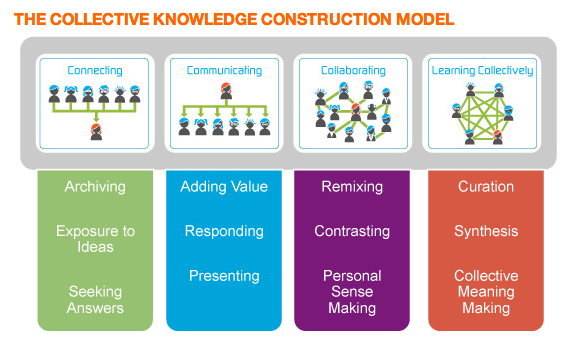Picture this :
- Connor comments on Matt’s first blog post and gives him advice as an experienced (6 months) blogger and wishing him ‘Good Luck’
- A Year 3/4 class participate in a global project with schools in South Africa/NZ/USA/UK/Canada and Chile using a Wiki and Edmodo to share stories
- Sue comments on Simon’s post with his published story, encouraging his writing
- Mary posts to Edmodo publicising her new blog post (having returned to blogging after a lapse of a month or so) and responds to a homework tasks by sharing her response on-line
- Teachers post comments on student blogs, praising, encouraging and suggesting
- Robyn and Mark trouble shoot issues with saving and exporting Kodu projects for entering to Screen It competition by consulting the on-line help
- Joe uses the chat feature on Skoodle (SuperClubsPlus) to get help from a classmate correcting his spelling words from home (he left the sheet at school)
- A new blogger asks for help from classmates on Edmodo
- A teacher posts on Edmodo reminding students to support a worthy cause they have been discussing
- Brenden requests to use You-tube to look up a movie how to create a bridge using Kodu (game making software)
- Teachers sharing resources and ideas via a Yammer community
- A student adds a page to his blog linking to his YouTube channel (created at home) with ‘How-To’ videos he has created. (An opportunity here for discussion about Terms of Service that he is breaking)
- A new season of Quad-blogging begins as the US school year opens
- Students publish their thoughts about their current animation project on Edmodo
- Staff share resources and ideas on a Yammer network
- A teacher emails parents, praising student work, highlighting ways they can be involved, raising awareness of events and blog posts
- A Year 3 student emails me on the weekend asking for his SuperclubsPlus log in details as he left them at school
- Class teachers constantly posting to Twitter to advertise their new blog posts and connecting with other educators
- A group of students working on a collaborative project decide to create a data chart to itemise their roles and responsibilities
- An author responds to the draft writing of students that they have published on their blogs for feedback
- The mother of a fresh blogger responds to her son’s writing
- A new class blog connecting with a buddy class at a nearby school to promote commenting skills
- A teacher from another school responds to a student’s post
- Sarah uses Edmodo to ask her classmates for opinions as to the language to select for Year 7 next year
- Susan, a student from another school introduces herself to Samara from our school as another Student blogging Challenge participant
- Sue W, the organiser of the Student Blogging challenge comments on student blogs, welcoming them to the challenge.
Do you get the idea? A fortnight in our on-line world. So it made me think …. Each conversation can be considered in regard to Richard Olsen’s Model.
The purpose of this white paper is to use the Collective Knowledge Construction Model to identify strategies by which knowledge construction is facilitated when learning online. And, secondly to encourage teachers, school leaders and other stakeholders to reimagine the pedagogical, technical and contextual consequences that arise from teaching and learning in technology rich environments.
I find it helpful to refer to this and ponder where we are and where we might direct the learning so we continue to explore the possibilities created by our involvement in the online world. Where to next?

I have just read a wonderful expose of the reality, wonders and progress of on-line learning. Immersed as I am in many of these experiences, it’s as though I find myself flying downstream in the current, enjoying the speed, urged on, never stopping, with hardly time to see what’s around, such is the speed of the journey!
The reality is, I am not alone. Fortunately, there are some signposts and synthesis available. And for sure Richard Olsen’s model is one of these. It’s challenging, after forty years of teaching, to throw out the chalk and the desks, the lecturing and p.24 of the textbook…to embrace the round coloured tables, the netbooks, the opinions of students, the world in my classroom now…and to ensure it is all purposeful, engaging and, dare I say it, educational. But, I must admit, I love the ride, it is engaging for me as an educator and I want to try still to be better at what I am doing!
But rigorous examination, dissection, documentation and consideration must accompany the journey. I personally have found the Collective Knowledge Construction Model as offering a logical framework that encapsulates the movement I find myself a part of as an educator today.
I agree. Richard Olsen’s Collective Model is highlighted in varied examples listed in Celia’s reflection.
This is certainly engaging learning and the reflections of others assists me in articulating my learning.
These are exciting and challenging times in education.
[…] (typeof(addthis_share) == "undefined"){ addthis_share = [];}My previous post highlighted what I perceive to be wonderful leaps forward in our collaborative and purposeful use […]